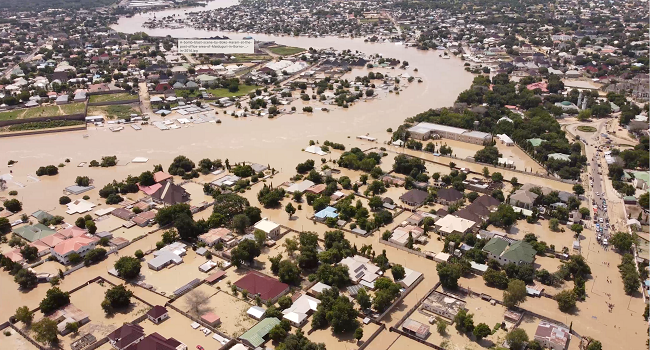Officials from the United Nations and humanitarian organizations have visited Maiduguri to assess the impact of the devastating floods in the region.
Led by UN Resident and Humanitarian Coordinator in Nigeria, Mohamed Fall, the team, which included international and national NGOs, arrived in Borno State’s capital on Saturday to evaluate the Alau Dam flood disaster.
This was revealed in a press statement on Sunday by Oluseyi Soremekun, National Information Officer for the UN Information Centre.
According to Soremekun, the team met with affected residents, government officials, and Borno State Governor, Professor Babagana Zulum, to assess the damage and discuss immediate support measures.
“The flood-affected people are facing a crisis within a crisis, as the floods occurred during a severe food insecurity and malnutrition crisis.
“I witnessed firsthand the devastation and hardship caused by the flooding, including the destruction of homes, businesses, and infrastructure. I also saw the suffering of the affected communities,” Fall stated.
The delegation pledged prompt action to alleviate the suffering of displaced families, including providing food, clean water, sanitation facilities, and shelter.
They noted that many of those affected by the floods, which are reported to be the worst in 30 years, already had significant humanitarian needs before the disaster. Having been displaced multiple times due to conflict and insecurity, these individuals are now even more vulnerable.
One Million Displaced
More than one million people have been displaced in and around Maiduguri due to one of the worst floods in the history of Nigeria, Africa’s most populous country. Maiduguri serves as a central hub for the response to the ongoing humanitarian crisis in the northeast.
Thousands of homes were submerged as floodwaters surged following the collapse of a dam after a weekend of torrential rain in northeastern Nigeria.
Barkindo Mohammed, Director General of the Borno State Emergency Management Agency (SEMA), informed AFP that the number of displaced individuals could reach one million.
One resident, Mohammed Sheriff, 60, recounted how he and his two wives managed to save six of their children when floodwaters rushed into their home during the night. However, their two eldest children, aged 11 and 13, went missing.
“We haven’t seen them since and we fear the worst,” Sheriff told AFP.
The National Emergency Management Agency (NEMA) said on Wednesday that at least 30 people have died in the floods — the worst in 30 years, according to the United Nations refugee agency in Nigeria.
Hunger and disease
NEMA’s Director General, Zubaida Umar, stated on X on Thursday that she was relieved to see the floodwaters in Maiduguri receding and that normalcy is beginning to return to the city. She noted that rescue operations are still underway in the city, which had been inundated up to 40 percent.
“Children and families are still trapped in their homes,” British charity Save The Children said in a statement on Friday.
“The immense damage to water and sanitation services is driving up the risk of cholera and other water- and vector-borne diseases,” the NGO said, pointing out that the city’s two main hospitals had also been flooded.
The World Food Programme (WFP) said the disaster would increase the risk of food insecurity, particularly in the vulnerable northeast.
At least 259 people have been killed by flooding in Nigeria since the beginning of the rainy season, according to Umar.



